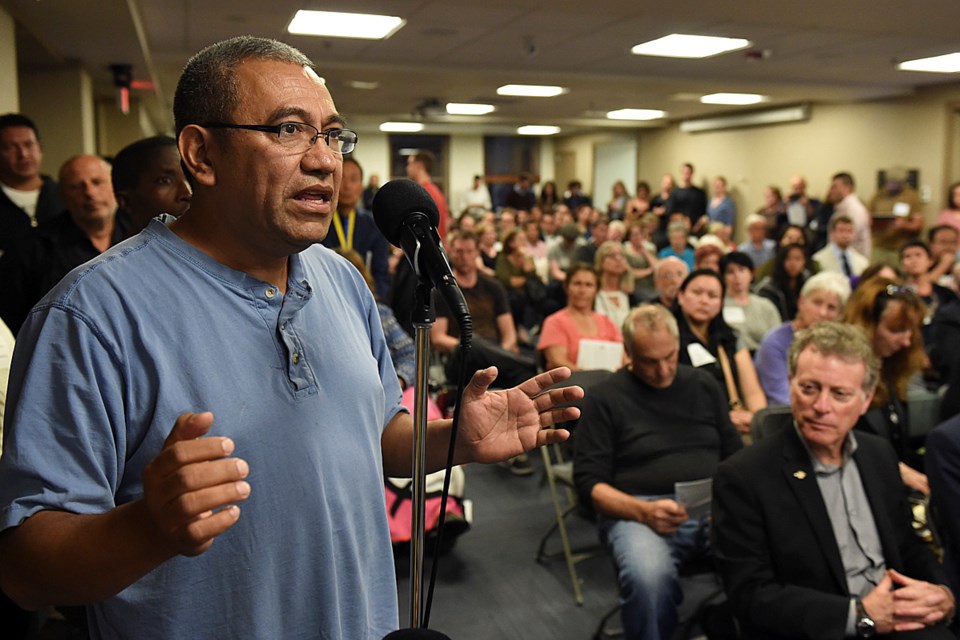It was billed as a forum to educate Vancouverites on how they can help Syrian refugees but it was made clear by experts on a panel that people in desperate situations all over the world, particularly in Africa, need resettlement options in safe countries such as Canada.
Chris Friesen, chairperson of the Canadian Immigrant Settlement Sector Alliance, and Eyob Naizghi, executive director of MOSAIC, made the point to more than 250 people gathered at city hall Tuesday who participated in Mayor Gregor Robertson’s forum on the Syrian refugee crisis.
“Just to put this into context, the UNHCR [United Nations High Commissioner for Refugees] has stated numerous times that the largest number of need for resettlement is actually from the continent of Africa, not the Middle East,” said Friesen, who sat at the front of the room with Naizghi and Robertson.
Presently, there are 60 million refugees and displaced people in the world, with the UNHCR requesting that countries make space for more than one million by next year. In 2014, a total of 28 countries settled refugees from abroad, totalling 74,000 people.
“Some are opening doors like Germany, some are closing their doors, so we have to be aware of that,” said Naizghi, a former refugee from Eritrea, near Sudan. “If we are not engaged in this process at this point in time, history will judge us.”
Canada’s annual target for refugees sponsored privately by families, faith groups and others is up to 6,500 people, with no cap on the number of Syrians allowed in the country. The target for refugees brought here by the Government of Canada is also up to 6,500 annually, although that could climb to 6,900 this year.
In the past 32 months, 72 Syrians have arrived in British Columbia as government-assisted refugees.
The plight of Syrian refugees intensified last week with the worldwide circulation of a photograph showing three-year-old Alan Kurdi’s lifeless body on a beach, his death a result of drowning during an attempted trip from Turkey to Greece with his family.
The boy’s story reached Coquitlam, where his aunt held an emotional news conference outside her front door that was followed a few days later with a memorial in Vancouver. Though the war in Syria has raged for several years, and equally graphic photographs of the carnage have reached the Western world, the photograph of young Kurdi triggered City of Vancouver staff to mobilize over the long weekend to set up Tuesday night’s forum.
Hours before the event, Premier Christy Clark was brought to tears at a news conference downtown as she recalled Kurdi’s death. Clark announced a $1-million “readiness fund” for Syrian refugees settling in B.C. The money will be used for counselling, help pay for sponsorship of refugees, reviews of foreign credentials so refugees can start work in B.C. and assist local governments in settling Syrian newcomers.
In his opening remarks at the forum, the mayor downplayed the event’s advertised exclusivity to address the Syrian refugee crisis, noting “there are other refugees in dire need from other parts of the world, as well, but certainly Syria and the Middle East is where the most acute need is right now, where we’re seeing a serious crisis.”
Robertson’s interest in the Syrian crisis prompted him to prepare a motion to go before city council that calls on the federal government to allow up to 20,000 government-assisted refugees into Canada by 2020, a move that generated applause from the forum’s audience.
One member of the audience, Byron Cruz of the group Sanctuary Health, which continues a campaign to ensure all migrants have access to health care and have Vancouver declared a “sanctuary city” where refugees can access services without fear, urged the mayor to establish working groups to bring people together who want to help refugees.
“In the memory of Alan [Kurdi], we should move forward,” Cruz said of the young boy. “Alan should be here with us today.”
Friesen told the crowd they could help refugees by donating to international organizations in the Middle East, which are stretched for tents, clothing and medical supplies. Volunteer for local refugee agencies and consider sponsoring a refugee, he said, although he noted the commitment was consuming.
“This is a complex process involving significant responsibility, costs, processing time, etcetera,” he said. “Think about, perhaps, fundraising for or volunteering for a pre-existing or experienced sponsorship holder.”
Friesen praised the City of Vancouver for its $4.1 million commitment to donating land and grants to the new construction of the new Vancouver “Welcome House” for refugees. As for the federal government, Friesen reminded the crowd of the government’s significant response to the plight of Kosovar refugees, which included expedited processing of people fleeing war-torn Kosovo.
“That’s the political will that created that opportunity,” he said of former prime minister Jean Chretien’s move in the late 1990s to allow 5,000 Kosovars to Canada over a four-month stretch. “It had nothing to do with where they were from, or what was their country of origin. It had everything to do with political will.”
Prime Minister Stephen Harper, who is campaigning for re-election, has said publicly that Canada wants to take in more Syrian and Iraqi refugees but cautioned the government could not airlift thousands of people out of “terrorist war zone” without proper process.
The mayor’s forum attracted a long line of people to speak directly to Robertson, Friesen and Naizghi. However, not everyone got to ask their questions. The mayor promised the city would provide a list of frequently asked questions, with answers, on the city’s website.
mhowell@vancourier.com
@Howellings



